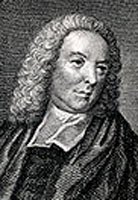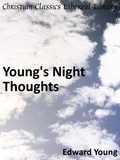Edward Young
English poet
Biography
Edward Young (June 1681 - 5 April 1765) was an English poet, best remembered for Night Thoughts.
He was the son of Edward Young, later Dean of Salisbury, and was born at his father's rectory at Upham, near Winchester, where he was baptized on 3 July 1683. He was educated at Winchester College, and matriculated in 1702 at New College, Oxford. He later moved to Corpus Christi, and in 1708 was nominated by Archbishop Tenison to a law fellowship at All Souls. He took his degree of D.C.L. in 1719.
His first publication was an Epistle to ... Lord Lansdoune (1713). It was followed by a Poem on the Last Day (1713), dedicated to Queen Anne; The Force of Religion: or Vanquished Love (1714), a poem on the execution of Lady Jane Grey and her husband, dedicated to the Countess of Salisbury; and an epistle to Joseph Addison, On the late Queen's Death and His Majesty's Accession to the Throne (1714), in which he rushed to praise the new king. The fulsome style of the dedications jars with the pious tone of the poems, and they are omitted from his own edition of his works.
About this time he came into contact with Philip, Duke of Wharton, whom he accompanied to Dublin in 1717. In 1719 his play, Busiris was produced at Drury Lane, and in 1721 his Revenge. The latter play was dedicated to Wharton, to whom it owed, said Young, its "most beautiful incident." Wharton promised him two annuities of £100 each and a sum of £600 in consideration of his expenses as a candidate for parliamentary election at Cirencester. In view of these promises Young refused two livings in the gift of All Souls' College, Oxford, and sacrificed a life annuity offered by the Marquess of Exeter if he would act as tutor to his son. Wharton failed to discharge his obligations, and Young, who pleaded his case before Lord Chancellor Hardwicke in 1740, gained the annuity but not the £600. Between 1725 and 1728 Young published a series of seven satires on The Universal Passion. They were dedicated to the Duke of Dorset, George Bubb Dodington, Sir Spencer Compton, Lady Elizabeth Germain and Sir Robert Walpole, and were collected in 1728 as Love of Fame, the Universal Passion. This is qualified by Samuel Johnson as a "very great performance," and abounds in striking and pithy couplets. Herbert Croft asserted that Young made £3000 by his satires, which compensated losses he had suffered in the South Sea Bubble. In 1726 he received, through Walpole, a pension of £200 a year. To the end of his life he continued to seek preferment, but the king regarded his pension as an adequate settlement.
Young, living in a time when patronage was slowly fading out, was notable for urgently seeking patronage for his poetry, his theatrical works, and his career in the church: he failed in each area. He never received the degree of patronage that he felt his work had earned, largely because he picked patrons whose fortunes were about to turn downward.
Though his praise was often unearned, often fulsome, he could write, "False praises are the whoredoms of the pen / And prostitute fair fame to worthless men."
In 1728 Young became a royal chaplain, and in 1730 he obtained the college living of Welwyn, Hertfordshire. In 1731 he married Lady Elizabeth Lee, daughter of the 1st Earl of Lichfield. Her daughter, by a former marriage with her cousin Francis Lee, married Henry Temple, son of the 1st Viscount Palmerston. Mrs Temple died at Lyons in 1736 on her way to Nice. Her husband and Lady Elizabeth Young died in 1740. These successive deaths are supposed to be the events referred to in the Night Thoughts as taking place "ere thrice yon moon had filled her horn."

